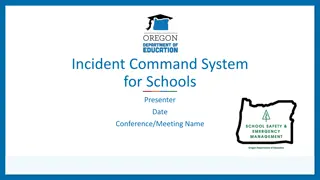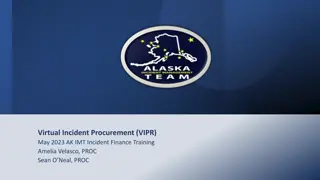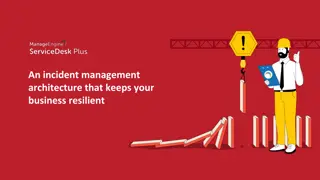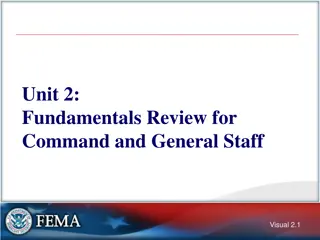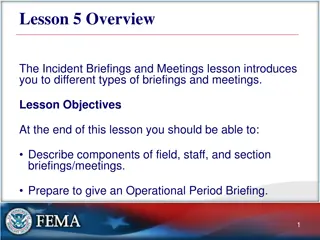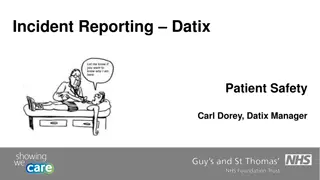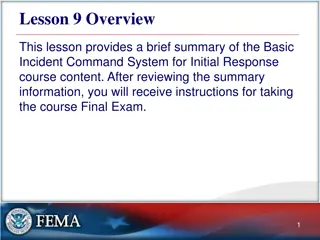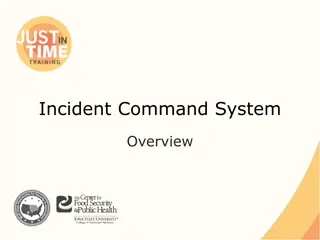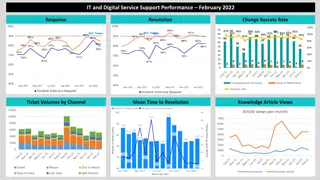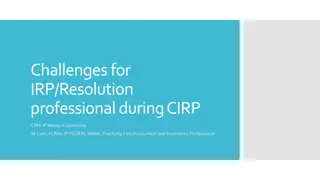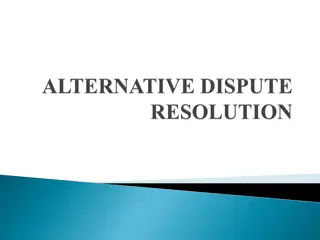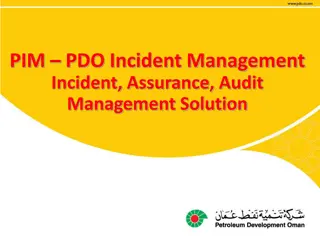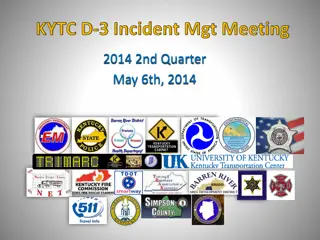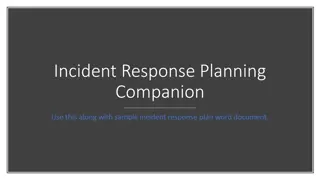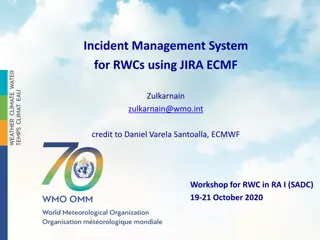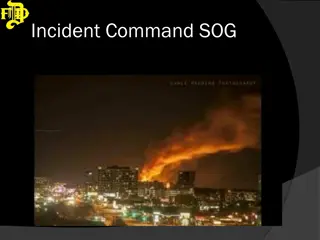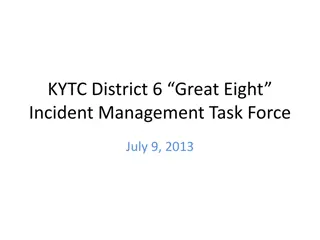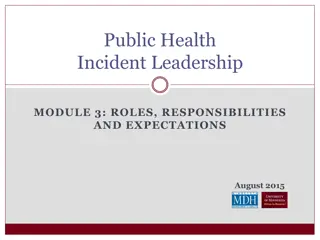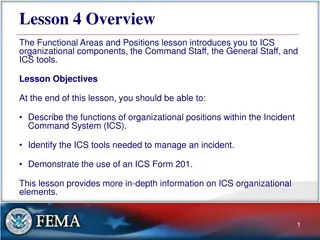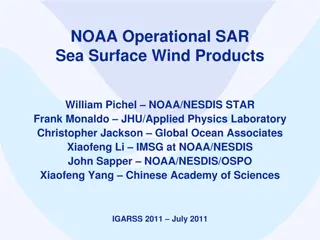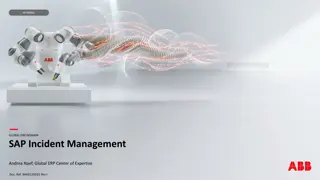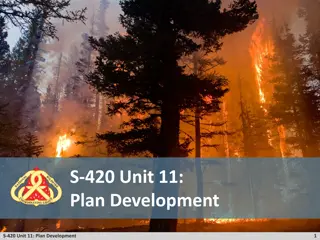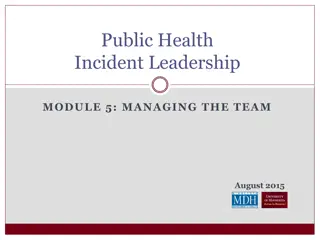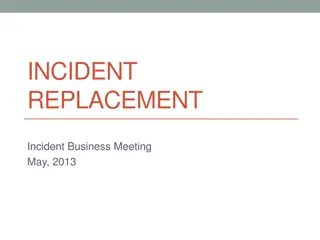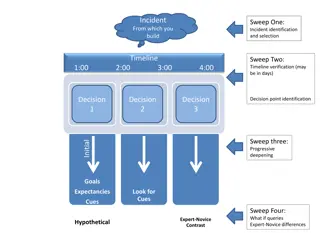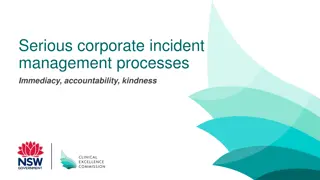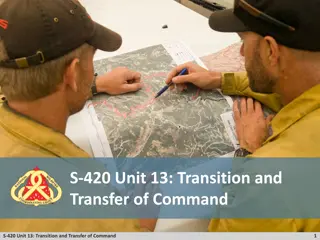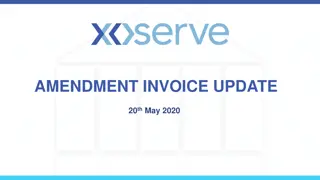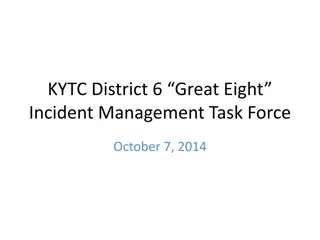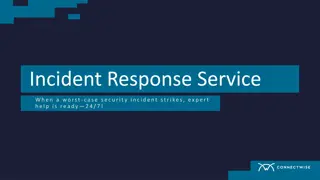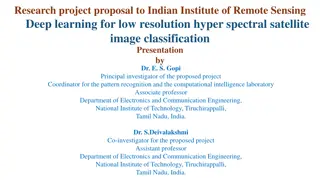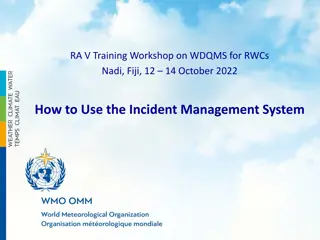Effective Incident Briefings and Meetings Overview
This lesson covers various types of briefings and meetings within the Incident Command System (ICS), including field, staff, and section briefings. It explores the Incident Action Planning Process for developing the IAP, emphasizing the importance of effective communication in incident management. T
0 views • 14 slides
Progressive Approach to Relational Entity Resolution
In this research paper authored by Yasser Altowim, Dmitri Kalashnikov, and Sharad Mehrotra, a progressive approach to relational entity resolution is presented. The study focuses on balancing cost and quality in entity resolution tasks for relational datasets. The goal is to develop a method that ac
1 views • 20 slides
Comprehensive Overview of Incident Command System for Schools
This presentation provides a detailed insight into the Incident Command System (ICS) for schools, outlining its purpose, structure, key concepts, and how individuals can fit into an ICS during emergencies. Topics covered include coordination with community partners, the importance of ICS, its struct
2 views • 16 slides
Understanding Virtual Incident Procurement (VIPR) in Government Agencies
Virtual Incident Procurement (VIPR) is a web-based system used by the United States Department of Agriculture, Forest Service (USDA-FS) for incident procurement. It includes Incident Blanket Purchase Agreements (I-BPA) that allow Contracting Officers to create, award, and manage solicitation and agr
3 views • 37 slides
Understanding the Patient Safety Incident Response Framework (PSIRF)
The Patient Safety Incident Response Framework (PSIRF) is set to replace the Serious Incident Framework (2015) within the NHS, marking a significant shift in responding to patient safety incidents. Its key aims include compassionate engagement, system-based learning, proportionate responses, and sup
5 views • 9 slides
Resilient Incident Management Architecture for Business Continuity
An incident management architecture helps a global educational technology vendor overcome a major network outage caused by human error during routine maintenance. Communication breakdowns and internal tool failures worsen the situation, highlighting the importance of swift, effective incident respon
2 views • 20 slides
Incident Management Fundamentals and Command Structure Review
Explore key NIMS doctrine concepts, agency policies, incident complexity factors, and Unified Command functions in managing complex incidents or events. Learn about Incident Action Planning, transfer of command, and the roles of Command and General Staff positions. Gain insights into incident comple
0 views • 11 slides
Understanding Resolution in Logical Inference
Resolution is a crucial inference procedure in first-order logic, allowing for sound and complete reasoning in handling propositional logic, common normal forms for knowledge bases, resolution in first-order logic, proof trees, and refutation. Key concepts include deriving resolvents, detecting cont
1 views • 12 slides
Incident Briefings and Meetings: Overview and Best Practices
This lesson covers various types of briefings and meetings within the Incident Command System (ICS), such as field, staff, and section briefings. Learn how to prepare and conduct operational period briefings effectively, understand the Incident Action Planning Process, and master the art of deliveri
2 views • 14 slides
Understanding Incident Reporting in Healthcare
Incident reporting in healthcare is crucial for patient safety and organizational improvement. An incident can encompass a wide range of events that cause or have the potential to cause harm, loss, or damage. Reporting incidents, including near misses, allows for learning from both mistakes and succ
0 views • 10 slides
Basic Incident Command System Overview
This lesson provides a summary of the Basic Incident Command System for Initial Response course content. It covers the NIMS framework, ICS management systems, incident command structure, unity of command, communication protocols, delegation of authority, and management by objectives. Understanding t
5 views • 15 slides
Incident Command System Overview and Structure
Incident Command System (ICS) provides a standardized approach to incident management. It offers flexibility, adaptability, and efficient management for incidents of varying sizes and complexities. ICS consists of top-down structure with key functions like logistics, operations, planning, finance/ad
1 views • 22 slides
IT and Digital Service Support Performance Overview February 2022
Performance overview of IT and digital service support in February 2022 including incident response, resolution change success rate, ticket volumes, mean time to resolution, customer satisfaction, availability of critical services, and more. The data provides insights into response and resolution ef
1 views • 5 slides
Challenges Faced by Insolvency Resolution Professionals during Corporate Insolvency Resolution Process
Insolvency Resolution Professionals encounter various challenges during the Corporate Insolvency Resolution Process, such as the need for prompt public announcements, appointing valuers, handling difficult transactions like preferential deals and related party transactions, assessing fraudulent acti
0 views • 8 slides
Innovative Dispute Resolution Mechanisms: ADR in India
The concept of settling disputes through Alternative Dispute Resolution (ADR) in India introduces non-adversarial mechanisms for resolving legal suits between parties. ADR encompasses negotiation, mediation, arbitration, conciliation, and case evaluation, offering a more collaborative approach to co
0 views • 16 slides
Effectiveness of Conflict Resolution Education in Schools
Conflict resolution education plays a crucial role in transforming school environments by reducing violence and promoting win-win outcomes. Various successful programs have shown significant improvements in school settings, such as reduced suspensions and conflicts among students. Conflict resolutio
7 views • 6 slides
Recent Developments on Super-Resolution: A Comprehensive Overview
Super-resolution technology aims to reconstruct high-resolution images from low-resolution inputs, with applications in video surveillance, medical diagnosis, and remote sensing. Various convolutional neural network (CNN) models have been developed, such as SRCNN, VDSR, ESPCN, and FSRCNN, each with
0 views • 12 slides
Upgrade Highlights: Incident and Action Modules Enhancements
Explore the latest upgrades in the incident and action modules, including improved navigation, enhanced access controls, workflow changes, and new feature implementations like transportation consequences. Stay updated on the revamped Incident Management and Audit Solutions for efficient incident han
0 views • 10 slides
KYTC.D-3 Incident Management Meeting 2nd Quarter May 6th, 2014
The KYTC.D-3 Incident Management Meeting for the 2nd quarter of 2014 held on May 6th discussed various topics including recent incidents, emergency plans, construction projects, spill cleanup, and upcoming training opportunities. Detailed incidents such as crashes and fires on I-65 and Nunn Pkwy wer
0 views • 24 slides
Cyber Incident Response Planning and Team Organization
This comprehensive incident response planning companion provides guidelines for creating effective policies and plans, emphasizing the importance of customization to suit each agency's unique circumstances. It outlines the purpose, objectives, and structure of an incident response plan, along with t
0 views • 16 slides
Incident Management System Workflow for RWCs Using JIRA
This incident management system for Regional Warning Centers (RWCs) using JIRA helps streamline the process of raising, evaluating, and resolving issues. Users can raise new tickets, track status updates, propose solutions, and escalate incidents if necessary. With designated roles and clear workflo
1 views • 18 slides
Incident Command Structure and Span of Control Overview
Incident Command Structure helps in managing incidents effectively by utilizing ICS terminology and levels as needed. The flexibility within ICS allows for structuring incidents correctly based on individual needs. Understanding the Span of Control is crucial for supervisors to manage the number of
2 views • 24 slides
KYTC District 6 Great Eight Incident Management Task Force Meeting Recap
Recap of the KYTC District 6 Great Eight Incident Management Task Force meeting held on July 9, 2013. The meeting covered incident reviews including a truck fire and fuel spill in Harrison County, responsibilities for debris removal after a truck/camper crash in Carroll County, a two semi crash in G
0 views • 44 slides
Public Health Incident Leadership: Roles, Responsibilities, and Expectations
Explore the positions, responsibilities, and expectations within the Incident Command System in public health incidents. Learn about the Incident Commander's role, the need for timely decision-making, and the structure of the Incident Command System. Understand the importance of common processes and
0 views • 37 slides
Understanding Incident Command System (ICS) Organizational Components
This lesson introduces the key components of the Incident Command System (ICS), including the Command Staff, General Staff, and essential tools. It covers the roles of the Incident Commander, Deputy Incident Commander, and Command Staff positions, emphasizing their functions in managing incidents ef
0 views • 40 slides
NOAA SAR High-Resolution Coastal Winds Overview
NOAA's Operational SAR Sea Surface Wind Products provide detailed information on wind patterns derived from SAR images. The system aims to implement high-resolution wind production, capable of deriving winds from various SAR satellites. The operational goals include compatibility with international
0 views • 28 slides
SAP Incident Management Overview
SAP Incident Management provides a structured process for handling incidents related to SAP landscape. The support process involves searching for solutions, opening customer incidents, and providing timely support. Different support offerings like Product Support for Large Enterprises ensure efficie
0 views • 17 slides
Incident Management Plan Development Process Overview
The incident management plan development process involves activities such as preparation for tactics meeting, conducting the tactics meeting, and preparing for the planning meeting. The tactics meeting is crucial for breaking down overall incident objectives into tactical assignments for the next op
0 views • 8 slides
Effective Management of Public Health Incidents: Objectives and Team Leadership
Learn the importance of distinguishing between management objectives and incident objectives, linking objectives to response activities, and leading an Incident Management Team through the Planning P process. Explore the difference between general management objectives and operational incident objec
0 views • 28 slides
Lessons Learned from Roanoke City Health Department's Active Shooter Incident
Roanoke City Health Department faced a threat of an active shooter in 2016. The incident prompted immediate response actions, including mobilizing an incident command team and enhancing security measures. Transitional responses involved state-level collaboration for investigation and operational sec
0 views • 10 slides
Incident Replacement Procedures and Guidelines in Business Meetings
Explore the process of incident replacement in business meetings, including who needs replacement items, approval authorities, and necessary forms to complete. Reference materials such as the IIBMH handbook and NWCG guidelines provide detailed insights into managing incidents effectively. Understand
0 views • 25 slides
Effective Incident Resolution and Spreadsheet Management Techniques
Explore incident identification, timeline verification, decision-making processes, and deepening strategies for successful resolution. Also, learn how to efficiently manage spreadsheets for data analysis and reporting. Enhance leadership skills for improved interpersonal communication and command.
0 views • 6 slides
Corporate Incident Management Processes and Policy Update
Explore the corporate incident management processes and policy updates focusing on immediacy, accountability, and kindness. Learn about incidents, harm scores, and revised process steps outlined by the Clinical Excellence Commission and NSW Health. Discover the differences between the current and re
0 views • 17 slides
Transition and Transfer of Incident Command
Ensuring effective transition and transfer of incident command is crucial for incident management. This involves activities such as demobilization planning, transfer of command planning, incident package creation, and more. Detailed plans need to be in place to facilitate a smooth handover of author
0 views • 12 slides
Amendment Invoice Update Summary and Resolution Plan
Unique MPRNs with ASP mismatch issues were addressed, avoiding customer updates this month. An improved extraction process led to early file delivery and resolution steps cataloging was completed. Automation of exception resolution is in progress. Defect resolution was impacted by prioritization and
0 views • 10 slides
KYTC District 6 Incident Management Task Force Meeting Summary
The meeting of the KYTC District 6 Great Eight Incident Management Task Force on October 7, 2014, covered various incident reviews including the I-75 Brent Spence Bridge crash and an overturned semi on US 42. The meeting included introductions, approval of previous meeting minutes, and discussions o
0 views • 48 slides
ConnectWise Incident Response Service: Expert Help for Security Incidents
ConnectWise Incident Response Service offers expert assistance 24/7 for handling worst-case security incidents. Gain direct access to incident response analysts, real-time management, recovery procedures, insights on attacker tactics, and post-incident monitoring. Choose from flexible service option
0 views • 13 slides
Understanding Spatial Resolution in Astronomical Imaging
This lecture delves into the requirements for resolution and sensitivity in astronomical imaging, exploring factors such as spatial resolution, optical design aberrations, and noise sources. It explains how spatial resolution is crucial in distinguishing objects, discussing the Rayleigh criterion an
0 views • 45 slides
Deep Learning for Low-Resolution Hyperspectral Satellite Image Classification
Dr. E. S. Gopi and Dr. S. Deivalakshmi propose a project at the Indian Institute of Remote Sensing to use Generative Adversarial Networks (GAN) for converting low-resolution hyperspectral images into high-resolution ones and developing a classifier for pixel-wise classification. The aim is to achiev
0 views • 25 slides
Understanding Incident Management System for Regional WIGOS Centres
Incident Management System (IMS) plays a crucial role in resolving issues within the WIGOS Data Quality Monitoring System (WDQMS) process for Regional WIGOS Centres (RWCs). IMS for RWCs is a key operational tool alongside OSCAR/Surface and WDQMS Webtool. It is hosted by the European Centre for Mediu
0 views • 12 slides


